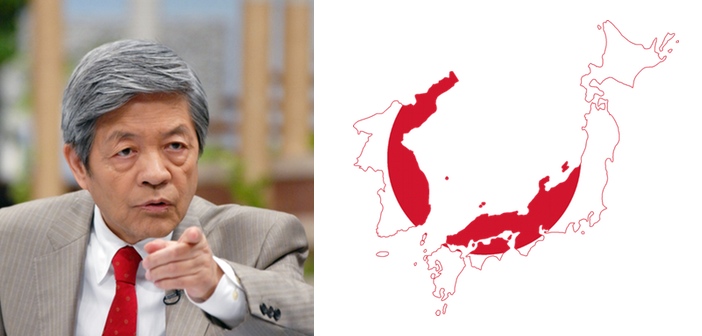Soichiro Tahara Says:
“Anti-Japanese Sentiment of South Korea Is Illusion Inflamed by Politicians and Media.”
It appears that the following article covering
this remark of Mr. Soichiro Tahara is being read by many people. I think that this is a quite important article
in the current media. Reading this
article, you will see that such anti-Japanese sentiment or anti-Korean
sentiment is being created by the media as well as through manipulation on the
Internet. If we know about it, we can
see such information manipulation unemotionally. Some bloggers, who assume that Japanese are
different from other races, write their blog posts about other races including
Koreans and Chinese who they brand as inferior people, and look down on them. I feel an urge to tell them “You are inferior,
aren’t you?” Although they are taken in
by the elite, such ill-natured people behave like intellectuals. It confirms that they are as low-level humans
as journalists.
Masatoshi
Takeshita
April
27, 2014
English translation of an excerpt from a
Japanese article: Weekly Asashi dot. – April 25, 2014 –
Soichiro
Tahara Says: “Anti-Japanese Sentiment of South Korea Is Illusion Inflamed by
Politicians and Media.”
Korean idols have disappeared
from the Japanese TV screen. In response to President Park Geun-hye’s
remarks and heated anti-Japanese sentiment of Korean
mass media, seemingly “anti-Korean” claims
have recently been seen in Japan, too. According to Mr.
Soichiro Tahara, a journalist, he had a chance to talk with his friend,
who is well-informed of Korea.
***
I had Mr. Katsuhiro
Kuroda, a special reporter and leader writer of the Sankei Shimbun residing in
Seoul, appear on a program “Heated debate! Crossfire” televised on April
12. I have make friends with him since
the 1970s when he was a reporter of Kyodo News.
Mr. Kuroda was fascinated with Korea when he visited the country in 1971 and
studied in Yonsei University in 1978.
After graduation, he became manager of the Seoul branch office of Kyodo
News. Since he wanted to stay in Korea, he found a
job in the Sankei Shimbun. He has been
associated in Korea for more than 40 years and he has
lived for about thirty years. We
might say that no other Japanese are well-informed of Korean than him.
I had Mr. Kuroda
talk about the reality of “anti-Japanese sentiment” in Korea. For example, President Park Geun-hye has been
strongly criticizing Japan in summit conferences in many countries including
the U.S. The Korean newspapers and TV stations
have disgustfully repeated furious attacks against Japan.
I met President Kim Yong-sam and President
Kim Dae-jung. I also met Mr. Lee
Myung-bak before he became president.
Each person said firmly that Korean and Japan should create a free and
affluent future arm in arm with each other instead of arguing about the past
historical issues. However, President Park Geun-hye and Korean mass media speak and
behave as if Korea and Japan were fighting in an apparent expression of hatred. In recent years, more and more Japanese
magazines and books have hate and verbally abused Korea.
So I asked Mr. Kuroda to explain the truth
of why Korean politicians and mass media express hatred
to Japan that much.
“Most of Korean
people actually have no anti-Japanese sentiment. I have no fear of my safety or never feel
uncomfortable while living in Korea. On the contrary, Koreans are very gentle and kind.”
Mr. Kuroda said so with a smile on his
face. According
to him, no phenomenon of refusal to Japan is seen in daily life. Although I could not believe it soon, Mr.
Kuroda frankly talked about how he felt.
Then, how can we
interpret such an abnormal criticism of Japan by President Park Geun-hye and
such an attack against Japan in an apparent expression of hatred by Korean mass
media? Mr.
Kuroda said with a wry smile like this.
“Media people believe
them to be intellectuals and have a strong belief that they, as intellectuals,
have to criticize Japan, which made Korea its colony, and should never forget
about the fact. Although they bash Japan
very hard, however, ordinary people don’t respond to it. They bash Japan all the more severely but
they never respond. Then they get all
the more angry. Such phenomenon is
repeatedly seen.”
Come to think of it, an executive of a big
travel agent told me that tourists from Korea have increased their number,
while those from Japan to Korea have decreased.
A few years ago, the number of Japanese
tourists, especially female tourists was growing due to “*Yon-sama boom” and
other Korean rage. However, according to
the executive, the number has decreased since President
Park Geun-hye,Korean politicians and media got to severely criticize Japan.
(Translator’s note) Yon-sama boom – A
Korean actor Bae Yong-joon gained great popularity in a TV program ‘Winter
Sonata’ among Japanese and has been called “Yon-sama” by Japanese fans,
especially female fans.
However, it does not appears to me that so
many ordinary Koreans are reading articles about Japan bashing by President
Park Geun-hye and Korean mass media. It
seems that Japanese would have felt rejection of Korea since
they read articles of many weekly and monthly magazines which attack Korea in
an apparent expression of hatred.
That means that in contrast to Koreans, Japanese
are so fragile that we tend to be easily
influenced by news reports which are manipulated to sell such magazines. We Japanese have to brace
up.

Leave a Reply